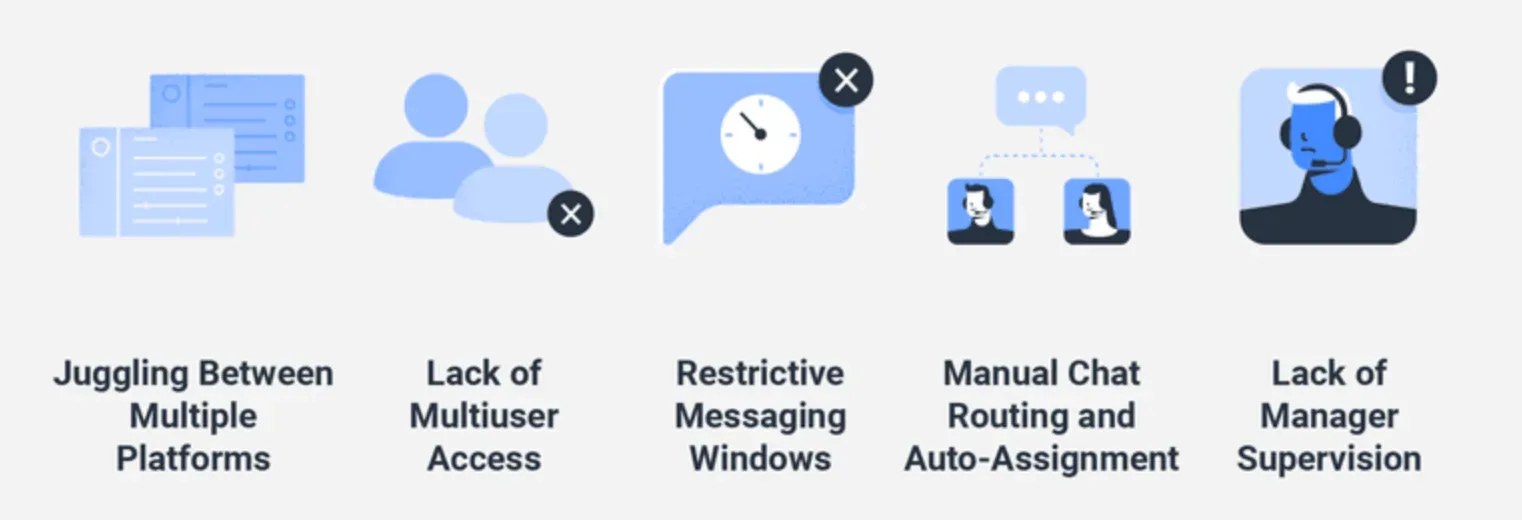What is Conversational Support?
Conversational support refers to the use of chat, messaging apps, voice, or other interactive mediums to provide real-time (or near real-time) assistance to customers. Let's break it down:
The essence of conversational support is to make customer service conversations more human-like, personalized, and efficient by leveraging technology.
Channels
This includes platforms like live chat on websites, social media messaging (Facebook Messenger, WhatsApp), SMS, and voice assistants.
Importance
It has become increasingly crucial in enhancing customer experience, offering quick solutions to problems, and improving customer loyalty.
Tools
Software and applications designed to facilitate conversational support, such as chatbots, AI-driven assistants, and CRM integrations.
Benefits
Conversational support can significantly reduce response times, increase customer satisfaction, and lead to higher conversion rates.
Who Uses Conversational Support?
Virtually every sector today implements conversational support, but let's explore who's getting the most out of it:
E-commerce
Online retailers use conversational support to assist customers in making purchasing decisions and resolving issues.
Technology
Tech companies offer it to help users navigate their products or services more effectively.
Healthcare
Patients receive assistance through conversational platforms for appointments, inquiries, and pre-diagnosis support.
Education
Educational institutions utilize it to communicate with students, provide information, and facilitate learning outside the classroom.
Financial Services
Banks and financial institutions offer conversational support for account inquiries, transactions, and financial advice.
When is Conversational Support Most Effective?
Timing can significantly impact the effectiveness of conversational support. Let’s pinpoint when it makes a real difference:
During Purchase Decisions
When customers are contemplating a purchase and need additional information or assurance.
In Crisis Situations
Providing immediate support in circumstances that require urgent attention or solutions.
For Complex Issues
When customers face complicated problems that require detailed explanations or guidance.
Post-Purchase Support
Helping customers with after-sales inquiries, such as returns, warranties, and use of the product.
Continuous Engagement
Periodic check-ins with customers to gather feedback, update on new offerings, or simply keep the relationship warm.
Suggested Reading:
Tiered Support
Where is Conversational Support Implemented?
The setting can dictate the success of conversational support. Here are key venues where it thrives:

On Websites
Live chat support provides immediate assistance to visitors, aiding in navigation, product selection, and queries.
Social Media Platforms
Brands actively engage with customers through direct messaging on platforms like Instagram, Twitter, and Facebook.
Mobile Apps
In-app messaging allows for real-time support without requiring the user to leave the application.
Call Centers
Integrating conversational AI to assist human agents in providing more efficient support.
Using conversational tones and immediate follow-ups in email support to create a more engaging experience.
Why is Conversational Support Important?
The value of conversational support in today’s business landscape is undeniable. Here’s why:
Enhances Customer Experience
It makes customer interactions more personalized and immediate, significantly improving overall satisfaction.
Boosts Sales
Direct interactions can gently nudge customers towards making a purchase through personalized recommendations and support.
Reduces Support Costs
Automation and AI can handle common inquiries, freeing human agents for more complex issues, thus optimizing resources.
Improves Resolution Times
Immediate engagement means faster solutions, reducing the customer’s frustration and enhancing their loyalty.
Enables Scalability
Businesses can handle a higher volume of inquiries without proportionally increasing the support team size.
How to Implement Conversational Support
Implementing conversational support requires strategic planning and the right tools. Here’s how:

Choosing the Right Channels
Identify where your customers prefer to communicate and establish your presence there.
Integrating with Your Tech Stack
Ensure that your conversational support tools integrate seamlessly with your existing CRM, helpdesk software, and other critical systems.
Training Your Team
Investing in training your team to effectively use conversational support tools and maintain your brand’s voice.
Setting Clear Objectives
Define what you aim to achieve with conversational support, whether it's reducing response times, increasing sales, or improving customer satisfaction.
Measuring Success
Track the performance of your conversational support initiatives using metrics like customer satisfaction scores, resolution times, and sales conversions.
Best Practices in Conversational Support
To maximize the effectiveness of conversational support, consider these best practices:
Personalization
Use customer data to tailor conversations and make interactions more relevant and engaging.
Proactive Engagement
Don’t wait for customers to reach out. Identify opportunities to initiate conversations, such as when a visitor has been on a check-out page for a long time without completing their purchase.
Continuous Learning
Regularly analyze interactions to identify patterns, common issues, and areas for improvement in your conversational support strategy.
Scalability
Prepare your conversational support system to efficiently manage ebbs and flows in customer inquiries.
Incorporating Human Touch
Ensure that there are clear pathways for customers to reach human agents when needed, maintaining the balance between automation and human interaction.
Challenges in Conversational Support
While conversational support brings numerous benefits, it also comes with its set of challenges:

Maintaining Consistency Across Channels
Ensuring that the customer receives a uniform experience regardless of the channel they choose.
Over-reliance on Automation
Finding the right balance between automated responses and human intervention to avoid alienating customers.
Privacy Concerns
Safely handling customer data and maintaining privacy, especially with stringent regulations like GDPR and CCPA.
Keeping Up with Technology
Staying abreast of advancements in AI and conversational technology to keep your support strategy effective.
Training and Development
Constantly training support team members to efficiently use new tools and technologies and to communicate effectively.
Future Trends in Conversational Support
The landscape of conversational support is ever-evolving. Stay ahead by understanding these future trends:
AI and Machine Learning
Further advancements in AI will enable more nuanced and complex customer interactions, making support even more personalized and efficient.
Omnichannel Support
Businesses will increasingly adopt a seamless approach, allowing customers to switch between channels without losing context.
Voice Technology
Voice assistants and speech recognition technology will play a more prominent role in how businesses offer support.
Predictive Support
AI-driven insights will enable businesses to predict customer issues and address them proactively, improving customer satisfaction.
Emotional AI
Emotion recognition technology will allow businesses to understand and respond to the emotional state of their customers, revolutionizing customer service.
Conversational support is more than just a customer service tool; it’s a dynamic and essential component of modern business strategy. Understanding its intricacies and staying updated with its evolution will empower businesses to offer unparalleled customer experiences.
Frequently Asked Questions (FAQs)
How Does Conversational Support Enhance Customer Service?
Conversational Support fosters real-time, personalized communication with customers, enhancing their experience and building stronger relationships.
Can Conversational Support Work on Multiple Platforms?
Yes, effective conversational support systems accommodate multiple channels including email, social media, live chat, and phone, providing seamless customer experience.
How Does AI Contribute to Conversational Support?
AI chatbots and natural language processing (NLP) facilitate automated, instant responses, managing simple queries and freeing up human agents for complex issues.
Does Conversational Support Affect Customer Retention?
Indeed, by solving issues promptly and providing personalized attention, conversational support can significantly improve customer satisfaction and retention.
Can Conversational Support Provide Customer Insights?
Absolutely. The real-time interactions offer valuable insights into customer preferences, behaviors, and pain-points, informing business strategies and improvements.

